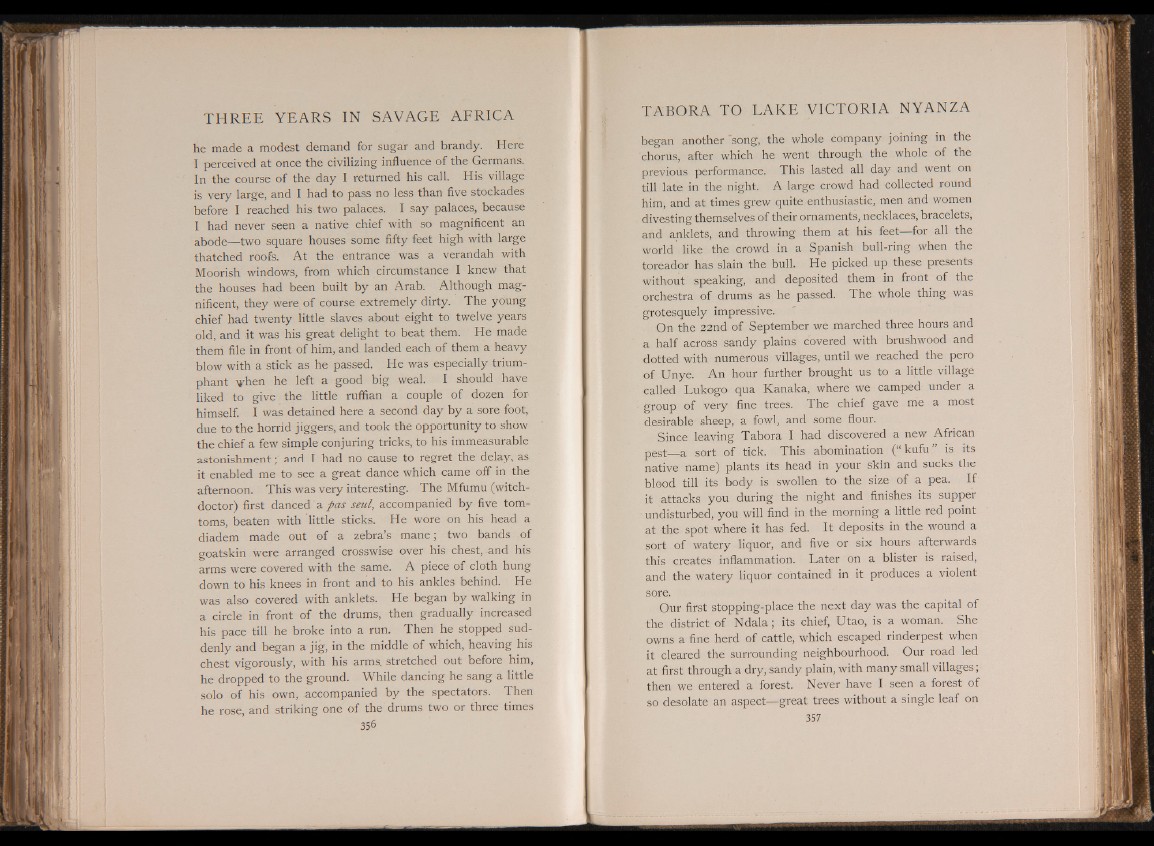
he made a modest demand for sugar and brandy. Here
I perceived at once the civilizing influence of the Germans.
In the course of the day I returned his call. His village
is very large, and I had to pass no less than five stockades
before I reached his two palaces. I say palaces, because
I had never seen a native chief with so magnificent an
abode—two square houses some fifty feet high with large
thatched roofs. At the entrance was a verandah with
Moorish windows, from which circumstance I knew that
the houses had been built by an Arab. Although magnificent,
they were of course extremely dirty. The young
chief had twenty little slaves about eight to twelve years
old, and it was his great delight to beat them. He made
them file in front of him, and landed each of them a heavy
blow with a stick as he passed. He was especially triumphant
when he left a good big weal. I should have
liked to give the little ruffian a couple of dozen for
himself. I was detained here a second day by a sore foot,
due to the horrid jiggers, and took the opportunity to show
the chief a few simple conjuring tricks, to his immeasurable
astonishment; and I had no cause to regret the delay, as
it enabled me to see a great dance which came off in the
afternoon. This was very interesting. The Mfumu (witchdoctor)
first danced a pas seul, accompanied by five tomtoms,
beaten with little sticks. He wore on his head a
diadem made out of a zebra’s mane; two bands of
goatskin were arranged crosswise over his chest,-and his
arms were covered with the same. A piece of cloth hung
down to his knees in front and to his ankles behind. He
was also covered with anklets. He began by walking in
a circle in front of the drums, then gradually increased
his pace till he broke into a run. Then he stopped suddenly
and began a jig, in the middle of which, heaving his
chest vigorously, with his arms, stretched out before him,
he dropped to the ground. While dancing he sang a little
solo of his own, accompanied by the spectators. Then
he rose, and striking one of the drums two or three times
356
began another song, the whole company joining in the
chorus, after which he went through the whole of the
previous performance. This lasted all day and went on
till late in the night. A large crowd had collected round
him, and at times grew quite enthusiastic, men and women
divesting themselves of their ornaments, necklaces, bracelets,
and anklets, and throwing them at his feet—for all the
world like the crowd in a Spanish bull-ring when the
toreador has slain the bull. He picked up these presents
without speaking, and deposited them in front of the
orchestra of drums as he passed. The whole thing was
grotesquely impressive.
On the 22nd of September we marched three hours and
a half across sandy plains covered with brushwood and
dotted with numerous villages, until we reached the pero
of Unye. An hour further brought us to a little village
called Lukogo qua Kanaka, where we camped under a
group of very fine trees. The chief gave me a most
desirable sheep, a fowl, and some flour.
Since leaving Tabora I had discovered a new African
pest—a sort of tick. This abomination (“ kufu” is its
native name) plants its head in your skin and sucks the
blood till its body is swollen to the size of a pea. If
it attacks you during the night and finishes its supper
undisturbed, you will find in the morning a little red point
at the spot where it has fed. It deposits in the wound a
sort of watery liquor, and five or six hours afterwards
this creates inflammation. Later on a blister is raised,
and the watery liquor contained in it produces a violent
sore.
Our first stopping-place the next day was the capital of
the district of Ndala; its chief, Utao, is a woman. She
owns a fine herd of cattle, which escaped rinderpest when
it cleared the surrounding neighbourhood. Our road led
at first through a dry, sandy plain, with many small villages;
then we entered a forest. Never have I seen a forest of
so desolate an aspect—great trees without a single leaf on
357